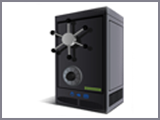IMDEA Networks

Emulating Highly Consistent Shared Storage on top of Unreliable Message-Passing Nodes

Nicolas Nicolaou, Post-Doc Researcher / Marie-Curie Fellow, IMDEA Networks Institute
In-house Presentation
Distributed Storage Systems ensure data availability and survivability be replicating data in geographically disperse storage devices. Replication allows multiple processes to access the data concurrently each communicating with different storage device. Concurrency in turn raises the problem of data consistency. How can we ensure that operations on the storage always detect the latest value of the data? To describe the consistency guarantees of a concurrent structure, researchers described various consistency semantics. The strongest of those is atomicity which provides the illusion that a distributed object is accessed sequentially even if it can be accessed concurrently. Due to the complexity of the problem researchers has focused in atomic objects with simple semantics like read/write registers. We are going to present some solutions of emulations of atomic read/write registers on top of asynchronous, fail-prone devices that communicate via messages. We will present the metrics used to evaluate these solutions and we will briefly present some lower bounds on the problem.
About Nicolas Nicolaou
Nicolas Nicolaou joined IMDEA Networks Research Institute in December 2014 as an Intra-European Marie Curie Fellow. Previously he hold the position of Visiting Lecturer at the University of Cyprus in Nicosia ( 2011 -2013) and he served as a Special Scientist at the Cyprus University of Technology (2013-2014). Before that he worked as a Research Assistant in the Dependable Distributed Systems Lab at the University of Connecticut USA, and as a Senior Research Assistant in the VoTeR Lab at the same University. Nicolas obtained a Ph.D. in 2011 and an M.S. in 2006 from the Department of Computer Science and Engineering at the University of Connecticut. He obtained his B.S. in Computer Science from the University of Cyprus in 2003. His PhD dissertation entitled “Trade-offs in implementing consistent distributed storage systems” studied the trade-offs between the efficiency and scalability of atomic distributed memory implementations.
His main research interests focus on the analysis, design and implementation of practical and robust distributed and parallel algorithms, design and implementation of algorithms for consistent distributed storage systems, ad-hoc mobile and sensor networks and evaluation and exploitation of voting technologies. His research was published in top conferences like PODC, DISC, SPAA, and journals like JPDC, IEEE Transactions on Information Forensics and Security in the fields of distributed computing, networks and security. For his work he received funding from the Cyprus Research Promotion Foundation (2010-2011) and secured an Intra-European Marie-Curie Fellowship (2014-2016).
This event will be conducted in English

